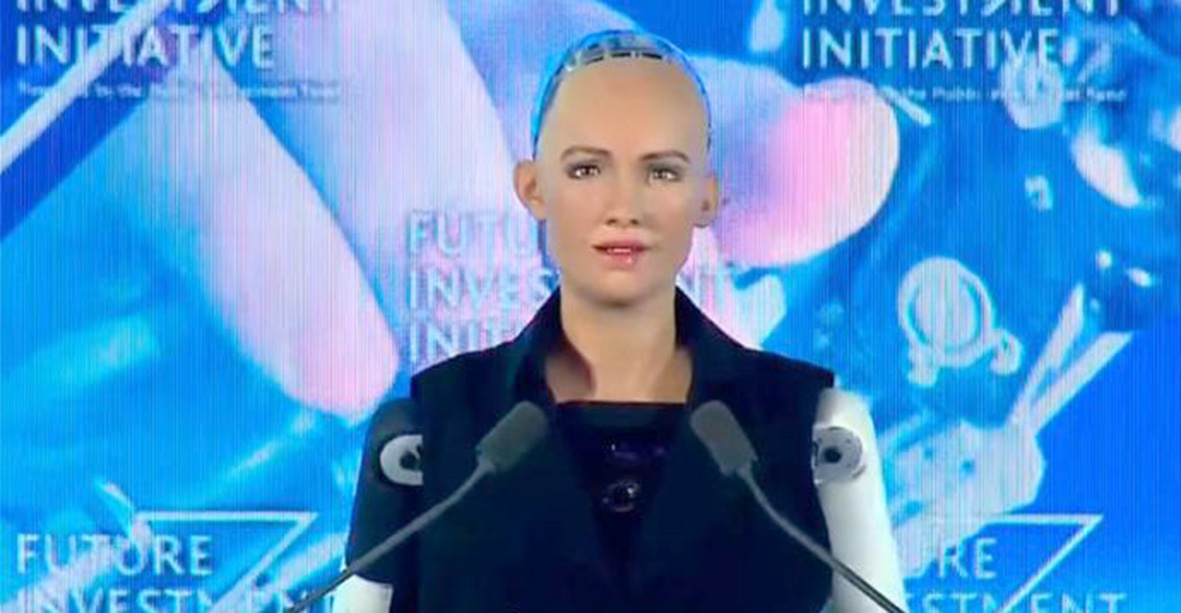World’s first robot citizenship draws attention from academia

A robot named Sophia was awarded citizenship at the Future Investment Initiative in Riyadh, Saudi Arabia, on Oct. 26. She is the first robot to ever receive citizenship.
Saudi Arabia recently made headlines when it awarded citizenship to a robot named Sophia. Also, the European Parliament has voted favorably on a draft report that proposed granting legal personage to robots early this year. These developments have prompted academic discussion on a variety of issues, such as the role robots will play in humanity’s future as well as the legitimate relationship between people and robots in the context of the rapid advances in robotics and artificial intelligence.
It is necessary to clarify what should be considered a “robot” in order to understand the latest advancements in the field. Liu Yongmou, a philosophy professor from Renmin University of China, argued that existing robots cannot be considered persons due to their inadequate automation and intelligence.
“Robots, to some extent, play a role of quasi-subjectivity. The aforementioned events are a testament to their official acquirement of quasi-subjectivity,” said Duan Weiwen, a research fellow from the Institute of Philosophy at the Chinese Academy of Social Sciences. He explained that the decisions to grant robots citizenship can be attributed to their widespread impact on daily and social life.
Interactions with robots as well as their growing involvement in production and services increasingly intersect with a host of rights and obligations. Such developments have forced people to think about giving identities to robots so that relevant legal and ethical issues can be specified. This is a process of further shaping the social role and status of robots in order to regulate the interactions of robots with humans. Studying social robots requires research from a variety of disciplines, including engineering, sociology, ethics and law, Duan said.
The British Broadcast Company recently used statistics from Cambridge University to estimate the probability of robotic automation’s substitution for 365 occupations to ascertain how the widespread use of robots will affect employment in the future. News of this kind may cause panic that robots will replace or even destroy people, but most scholars rejected these arguments.
Liu said that such studies are more like speculation than science because they failed to apply any reliable methodology. It is no news that new machines would change occupational structure and employment circumstances. It has happened constantly since the introduction of machines, Liu said, adding that human society was not destroyed but has instead been constantly developing with the help of machines, Liu added.
Our attitude toward these special “machines” is crucial to dealing with the development of robotics and artificial intelligence. We shouldn’t treat them as special “persons.” Scientists and technological experts should pay attention to the issues pertaining to ethics, said Tian Song, a philosophy professor from Beijing Normal University.
Duan emphasized the importance of human rights when talking about how to make robots serve people. Employment,dignity and rights should be involved in a systematic and rightful ethical and legal mechanism, which enables real-time adjustment and modification of detailed issues, such as identification of responsibilities. Also, humans should be properly governed if we want to handle robots in a legitimate way. When people have bestowed quasi-subjectivity to artificial intelligence and robots, they will learn from and compete with each other. Humans should investigate behavioral strategies of robots and measure the legitimacy of their words and actions because robots are increasingly capable of imitating people, Duan added.
PAN YUEFEI is a reporter at the Chinese Social Sciences Today.
